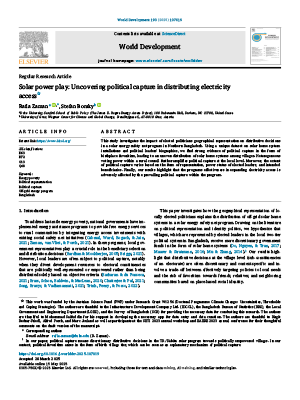Publications
Can Private Finance Save the World's Forests and Oceans?
To scale debt-for-nature swaps and related financial instruments, the G20 and COP30 must expand opportunities for credit enhancement, reform sovereign credit rating systems, employ conservation performance metrics, and improve stakeholder participation.
Engaging Communities, Aligning Strategies, and Scaling Solutions: A Report from HeatWise DC
HeatWise DC—a continuation of the HeatWise Policy Partnership launched in 2024—brought together 62 cross-sectoral leaders to confront the rising threat of extreme heat. Held in Washington, DC, the three-day event focused on rural vulnerability; national security and defense; and finance, insurance, and industry. Participants highlighted that while there are existing tools and knowledge to address heat, policy, funding, and delivery systems remain disconnected from the realities on the ground.
Identifying and Closing Gaps in Corporate Reporting of Ocean Impacts
As ocean industrialization accelerates, corporate transparency is increasingly seen as critical to improve governance. Yet little is known about how firms disclose their impacts on marine ecosystems. This study addresses that gap through a content analysis of sustainability and annual reports from 75 of the largest companies across 8 sectors of the ocean economy.
Solar Power Play: Uncovering Political Capture in Distributing Electricity Access
This study investigates the impact of elected politicians geographical representation on distributive decisions in a solar energy safety net program in Northern Bangladesh. Using a unique dataset on solar home system installations and political leaders’ biographies, we find strong evidence of political capture in the form of birthplace favoritism, leading to an uneven distribution of solar home systems among villages. Heterogeneous voting power within a rural council further amplifies political capture at the local level.
Hyperscaler Data Center Buildout: A Sustainability Bane, Boon, or Both?
Hyperscalers are large-scale cloud computing providers that operate massive data centers to support global digital services. The rapid expansion of hyperscale data centers is driven by increasing demand for cloud computing, artificial intelligence, big data analytics, and digital transformation across industry and government. These data centers can provide services such as computing and storage at enterprise scale but consume large amounts of energy and water to do so, posing sustainability challenges.
The Hidden Cost of Heat: Impacts to Bridges
Extreme heat is increasingly causing disruptions to critical infrastructure across sectors. With more frequent and intense heatwaves, infrastructure designed for milder conditions is being stressed beyond its capacity, resulting in higher maintenance demands and limited effectiveness of mitigation measures.
Memorandum: Potential Removal of Interim Targets in the NC Carbon Plan
North Carolina Senate Bill 266 (SB266) removes interim carbon emissions targets from the NC Carbon Plan. This memorandum evaluates an analysis of removing these targets conducted by Joseph DeCarolis, Anderson de Queiroz, and Jeremiah Johnson at North Carolina State University (summary of analysis; full analysis), including how alternative assumptions might affect its overall conclusions.
Stocktake Report: Heat Action Across United Nations Entities and International Organizations
This report examines the landscape of extreme heat management among United Nations entities and International Organizations for the first time, identifying challenges, opportunities, and strategies for improving collaboration and governance to support the United Nations Secretary-General’s Call to Action on Extreme Heat.
An Assessment of Heat Action Plans: Global Standards, Good Practices and Partnerships
This synthesis report identifies best practices and persistent challenges to provide a structured framework for improving heat resilience based on evaluations of heat action plans from six countries: Australia, Canada, France, India, the United Kingdom, and the United States. It advocates for an adaptable governance framework, proposing that national guidance related to Heat Action Plans incorporate adaptable core elements, such as standardized heat risk definitions, clear agency roles, multi-sector coordination, and early warning systems.
Narrative Analysis: Case Studies in Heat Resilience
This narrative analysis highlights how 12 countries are confronting the realities of extreme heat through diverse governance models, partnerships, and innovations. The case studies span multiple regions and development contexts—Argentina, Australia, Bangladesh, Canada, Ecuador, Egypt, France, India, Senegal, the Republic of Korea, the United Kingdom, and the United States, offering a cross-cutting view of what is working, where gaps remain, and how national strategies are evolving in the face of escalating climate threats.










